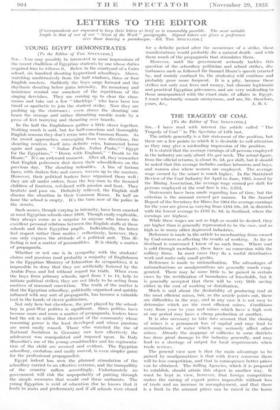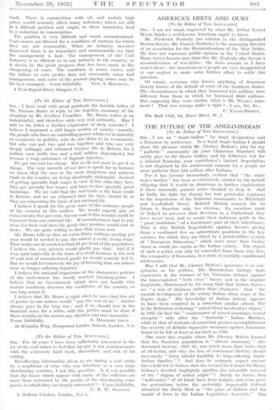THE TRAGEDY OF COAL
[To the Editor of Tar. SPECTATOR.] have read with interest the article called " The Tragedy of Coal " in The Spectator of 15th inst.
The article generally is a fair statement of the position, but there are a few points to which it is desirable to call attention as they may give a misleading impression of the position.
It is stated that the average earnings of all persons employed in the industry are only about 45s. per week. The actual figure, from the official returns, is about 9s. 2d. per shift, but it should be noted that this average includes surface labourers and boys, and women also where women are employed. The average wage earned by the miner is much higher. In the Statistical Review of the Coal Industry for April to June, 1935, issued by the Mining Association, the average wage earned per shift for persons employed at the coal face is 1 ls. 3.37d.
Statements have been made regarding loss of time, but the criterion is the amount earned per annum. In the Annual Report of the Secretary for Mines for 1934 the average earnings for the year are given as varying from X104 19s. 2d. in districts with the lowest average to ,e133 2s. 8d. in Scotland, where the earnings are highest.
While these wages are not as high as would be desired, they are higher than is generally represented to be the case, and as high as in many other depressed industries.
Reference is made in the article to merchanting firms owned by Coal-owners as affecting the results of working. As far as Scotland is concerned I know of no such firms. Where coal is sold through merchants, these have no connexion with the colliery firms. In most cases they do a useful distributive work and make only small profits.
Reference is made to rationalisation. The advantages of rationalisations or amalgamations are generally much exag- gerated. There may be some little to be gained in certain eases by the rectification of boundaries of leaseholds, but it is generally accepted that there will be very little saving either in the cost of working or distribution.
Much is said about the desirability of producing coal at the most efficient mines, but, as the article points out, there arc difficulties in the way, and in any ease it is not easy to determine which arc the most efficient mines. Conditions vary from year to year and mines which have a high cost at one period may have a cheap production at another.
It is also necessary to take into account that the closing of mines is a permanent loss of capital and may lead to accumulations of water which may seriously affect other mines. Already the stoppage of collieries in some districts has done great damage to the industry generally, and may lead to a shortage of output for local requirements when trade revives.
The general view now is that the main advantage to bo gained by amalgamations is that with fewer concerns there will be less competition, and that in consequence better prices can be obtained. The Selling Agencies, which it is proposed to establish, should attain this object in another way. It must be kept in view, however, that foreign competition makes the raising of export prices impossible without loss of trade and an increase in unemployment, and that there is a limit to the amount prices can be raised in the home
trade. There is competition with oil, and unduly high prices would seriously affect many industries which are still in a difficult position and might, in these industries, lead to a reduction in consumption. The position is very difficult and much misunderstood. Coal-owners are blamed for a condition of matters kir which they are not responsible. When an industry becomes depressed there is an immediate and unreasonable cry that the management is bad. The management of the Coal Industry is as efficient as in any industry in the country, as is shown by the great progress that has been made in the cheapening of costs. The condition in mines varies, and the failure to earn profits does not necessarily mean bad management, and some of the poorest paying mines may be
the best managed.—Yours faithfully, GEO. A. MITCHELL. 4 West Regent Street, Glasgow, C. 2.













































 Previous page
Previous page